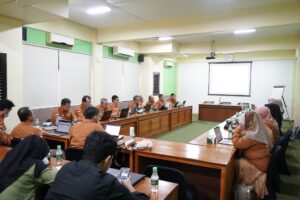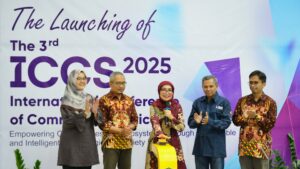
Indonesia is feeling the effects of extreme climate change. This is because the change and duration of seasons change and are difficult to predict. During 2019, climate change is the main cause of natural disasters in the country. To respond to these problems, various parties must make an integrated and massive movement.
The Universitas Muhammadiyah Yogyakarta (UMY) Disaster Expert, Rahmawati Husein, MCP, Ph.D. stated that extreme climate change is a widely discussed topic in the world. The weather changes in an unpredictable manner such as a high rate of rainfall, the long drought that caused fires in several countries, and the increasing intensity of storms
“Climate change has become a worldwide concern, and Indonesia is also affected by it. Disasters have increased by 15 to 30% because of climate change. In 2019, climate-related disasters are included in 99% of the data released by the National Disaster Management Agency (BNPB),” she said when interviewed in her office on Monday (1/7) of the UMY Campus.
She also stated that in 2020, things won’t be that much different when it comes to climate-related disasters.
The Deputy Chairman of Muhammadiyah Disaster Management Center (MDMC) of the Muhammadiyah Central Board also mentioned that this problem could not only be solved by one party. It needs support from various walks of life. The government can and should issue appropriate legal policies in controlling spatial planning and land use.
“If the land is not regulated, people will do anything they want with it. For example, they will plant nothing but palm oils, which can accidentally lead to field fires. The government needs to intervene with policies and rules, because these regulations are important,” She stated.
Rahmawati also explained that the Environmental Impact Assessment (AMDAL) permit and the Establishment Building Permit (IMB) are very important and have an impact on the environment. For this reason, the role of policy holders is to implement and enforce the rules properly. The rule should not be revoked, but examined why it does not work. If there is no control, there will be chaos for the environment.
The Situation in DIY
The Special Region of Yogyakarta (DIY) is one of the regions affected by extreme climate change. In the Gunungkidul Regency, a prolonged drought occurs every year. However, different problems are faced by residents of riverbank settlements in the city of Yogyakarta. High rainfall results in an increase in the volume of available water. In addition, open green spaces are decreasing because of the massive development of hotel buildings.
Rahmawati stated that government policies and intervention need to be created specifically to address the problems of each region.
“DIY can also be categorized as being affected by climate change, such as in Gunungkidul. The lack of water due to the long drought there can be remedied by providing water assistance. High rainfall and temperatures also suddenly caused a drop in temperature in several other regions. DIY has a problem, so it is important to have an integrated and comprehensive effort to address it,” she added.
A different solution needs to be done to anticipate the overflow of water that occurs in riverbank settlements. People must be aware of the dangers of throwing garbage in the river. Then, the government must also dig up the riverbed periodically, because garbage is not the only cause of river siltation. Material from Mount Merapi is also washed away by the flow of water. They also need to increase the number of green open spaces that is useful for water absorption.
“To prevent floods, there need to be green open spaces. Nowadays, open spaces are becoming scarce because of housing and hotel projects. land layout and usage need to be considered to support the environment. This makes sure that we can prevent floods, droughts, or water shortage,” she stated.
For the city of Yogyakarta, the uncontrolled building is also something that needs to be anticipated. If water recharge areas are nonexistent and the rivers aren’t cleaned, the region will be prone to flooding. The standard of open green spaces in Indonesia is 30%, but currently, there is only 5 to 15% available. (ak)






